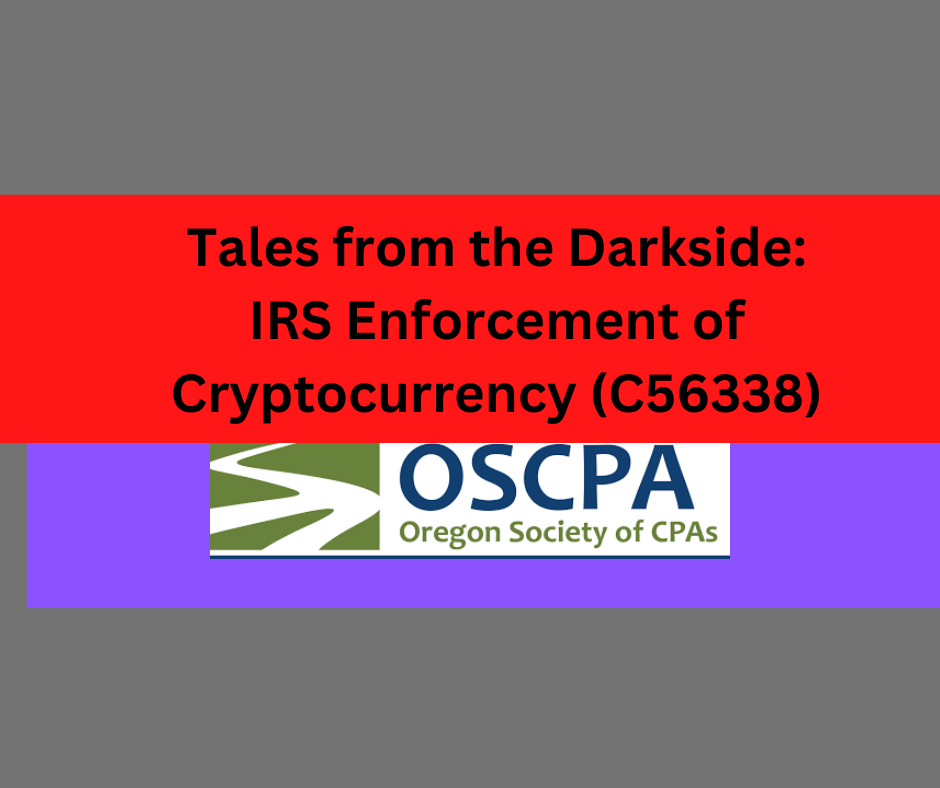·243 Views
Events
Blogs
Marketplace
Groups
Pages
More



Apr12
Tales from the Darkside: IRS Enforcement of Cryptocurrency (2 hours)
12 Apr 09:00 AM to 12 Apr 11:00 AM
Public Event
Hosted By tylerwinklevoss
Cryptocurrency
Tales From The Darkside: IRS Enforcement of Cryptocurrency
Course Description
Bitcoin and other cryptocurrencies have created a new generation of millionaires, with the benefit of anonymity. Whether the cryptocurrency is being used for criminal activity or held as a legitimate investment, the IRS is spending substantial resources in finding those who possess, purchase, and sell cryptocurrencies to ensure that the tax, banking, and money laundering laws are being followed.
The major questions that come here are:
Are you or your firm prepared to advise your client when reporting cryptocurrency transactions?
Can you identify when cryptocurrency is being used for potentially criminal purposes?
Can you prepare an accurate tax return related to cryptocurrency transactions?
Do you know what questions to ask your client or what documents to request?
This CPE course will give you a brief overview of cryptocurrencies, how this new technology is being regulated, the common ways that cryptocurrencies are used to evade tax and money laundering laws, and what is expected from taxpayers and their return preparers when cryptocurrencies are involved.
The major topics covered in this CE Tax Course include:
Overview of Bitcoin and cryptocurrencies
Definition of proof of work and proof of stake
Tax laws regarding cryptocurrency transactions
Definition of common money laundering laws involving cryptocurrencies
Tools used by the IRS to identify cryptocurrency transactions and cryptocurrency in criminal investigations
Real-life examples of cryptocurrency used in criminal activities
Your instructor, Robert Nordlander, is a former special agent with IRS Criminal Investigation. He spent many years finding, investigating, and prosecuting tax and money laundering crimes that were using cryptocurrency as a form of payment.
Learning Objectives
To discuss an overview of how Bitcoin and cryptocurrencies operate.
To recognize the difference between proof of work vs. proof of stake in verifying the blockchain.
To analyze how to prepare a proper tax return with cryptocurrency transactions.
To identify common money laundering violations involving cryptocurrencies.
To identify the tools used by the IRS to identify cryptocurrency transactions for civil and criminal violations.
To discuss real-life examples of cryptocurrency transactions.
Recommended For
This webinar is recommended for Accountants, CPAs, EAs, AFSPs, CRTPs, Tax Professionals, and Other Professionals who want to understand tools used by the IRS to identify cryptocurrency transactions and cryptocurrency in criminal investigations.
Who Should Attend?
Accountant, Accounting Firm, Accounting Managers, Accounting Practice Owners
Accounts Director, Certified Public Accountant (CPA),Chartered Accountant CPA (Industry),
CPA - Mid Size Firm, CPA - Small Firm, CPA in Business, Entrepreneurial CPA,
Maryland Tax Preparers, Oregon Tax Preparers, Tax Accountant (Industry), Tax Attorney
Tax Director (Industry), Tax Firm, Tax Managers, Tax Practitioners
Tax Preparer, Tax Professionals, Tax Pros, Young CPA
Overview
After attending this presentation you will be able to...
Give an overview of how Bitcoin and cryptocurrencies operate
Recognize the difference between proof of work vs proof of stake in verifying the blockchain
Prepare a proper tax return with cryptocurrency transactions
Identify common money laundering violations involving cryptocurrencies
Identify the tools used by the IRS to identify cryptocurrency transactions for civil and criminal violations
Recall the learning objectives in real life examples of cryptocurrency transactions
Highlights
The major topics covered in this class include:
Overview of Bitcoin and cryptocurrencies
Definition of proof of work and proof of stake
Tax laws regarding cryptocurrency transactions
Definition of common money laundering laws involving cryptocurrencies
Tools used by the IRS to identify cryptocurrency transactions and cryptocurrency in criminal investigations
Real life examples of cryptocurrency used in criminal activities
- Please log in to like, share and comment!
-
More Stories
